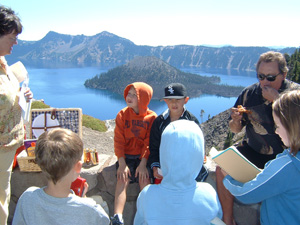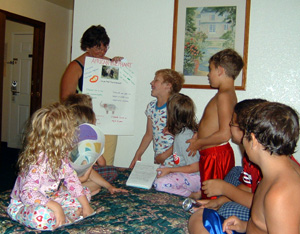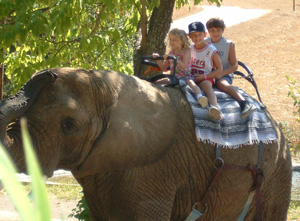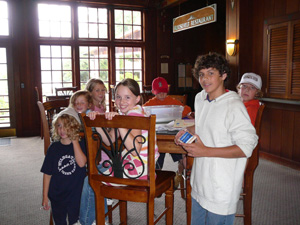Travel Planning |
More planning resources> |
RoadTrip Lifestyles
"Road Schooling" for the Education of a Lifetimeby Carol White
What if education didn't always happen in a classroom, in front of a blackboard, with 30 other kids and the bell about to ring? What if you could give your child or grandchild the education of a lifetime? What if you could spend a year - or a semester or a month - doing a really long field trip on the road? You can. It's called "road schooling" and it isn't as far-fetched as you might think. In fact, thousands of families are doing it right now. Some are home-schooling families with the time and curriculum to turn an RV into a classroom. Others are private- or public-school families taking vacation time to enrich a child's schoolhouse education as they travel. Either way, these families are cultivating wonder and adventure on America's highways. And their kids seldom whine, "Are we there yet?" Families on the Road Take the Goza family. They have been on the road since 1992. When their son, Zephyr, was 18 months old, Dennis and Kimberly Goza gave up their apartment in San Francisco, said goodbye to their 9-to-5 jobs, bought an RV and have been on the road ever since. Zephyr was road-schooled all along the way. The Gozas now have a Web site, FamiliesOnTheRoad.com, for other families who might want to live full time on the road - even for just a little while -- and they moderate a Yahoo! discussion group for road schoolers.
I recently asked Kimberly, "Why is road schooling so great?" "It is one thing to read about history, science, art and culture, but being able to live it firsthand is an experience that can't be duplicated" she replied. "Growing up as a full-time traveler, our son was able to visit battlefields, touch the Liberty Bell (before heightened security), hike the national parks, and lock the booth where President Lincoln was shot. These experiences and many others left indelible memories - a sense of ownership, pride and belonging." Other families hit the road for an adventure tied to a particular learning unit, or to broaden the home-school horizon. Such was the case for Amy Haroldson and her 9-year-old daughter, Caroline, who loaded up the family station wagon in the fall of 2007 and headed out for a six-week road journey as part of Caroline's fifth-grade home-schooling curriculum. They carefully mapped out a route, developed a plan to cover art, math, science, social studies, language arts and literature along the way, and put together a Web site called homeschoolacrossamerica.com (Update May 2021 – this link is no longer active) to chronicle their trip. "I am not sure Caroline would be too keen on the idea in five years," Amy says. "I am hoping that we will look back on it with the same feeling we have had with the whole home-school experience - as a really magical time together." What can you learn?
There is a lot to be gained from "edu-travel," no matter how you structure it. First there's the academic learning: the lessons about geography, geology, biology and history that present themselves right there on the roadside. Many educators will tell you that children learn more by doing than by reading or even watching. There is nothing better than a well-planned road-schooling curriculum to teach the practical value of math, the importance of reading, the joy of language and the realism of science. And don't discount those lessons in the vehicle: How many miles per gallon are we getting? How much pasta should we buy for that recipe for dinner? How long will it take us to get to the Space Center, which is 320 miles away? What propels the rockets we'll see there? You can keep your little Einstein busy from morning until night figuring things out -- and he won't even feel like he's studying. There are also many lessons to be learned in extracurricular encounters. As Kimberly Gozo puts it, "Road schooling also occurs in the small 'uneventful' moments -- playing in the tide pools in Malibu, hiking in the moonlike landscape at Craters of the Moon in Idaho, barn-dancing in Kentucky or meeting new friends at the playground." In fact, meeting interesting people was one of the best parts of the trip for young Caroline Haroldson. "I learned a lot about people," she told me. "What I thought was amazing was that everywhere we went, people were excited to share what they love about the place they live." She also came to appreciate that she lived "in a very special place, too." A trip of this type can teach much about diversity, respect, patriotism and tolerance as well as help develop an inquisitive mind - and these are good things to cultivate at any age.
As moms Kimberly and Amy suggest, there are many other benefits to road schooling. There's the family bonding that takes place in close quarters, the shared memories, the indescribable beauty of the landscape, the opportunity for physical activity, and the early love of travel. That trip to Williamsburg might not produce a historian, but it might spark a world traveler with fond memories of his early days traveling during school hours. And as for you? You get the thrill of seeing our world through a child's eyes. Just do it! "But wait," you say. "This all sounds great, but I can't just put my life on hold to do this, and besides, we're not made of money here." The truth is, if you really want to make this happen for your child and your family, you can. Traveling doesn't need to be more expensive than staying at home (especially if you rent your home out while you are gone to cover expenses), and many jobs today can easily be done from the road, at least for a short period of time. Thousands of families each year figure out a way to incorporate these ideals into their own life plans. As schools become more flexible and family-focused, you can usually make short-term arrangements with the children's teachers, and a longer-term journey can be accomplished by switching to a home-school curriculum for the semester or year.
If you can't manage a long adventure, consider using your vacation time to provide this meaningful experience for your family. Web sites like the Gozas' will help you with the planning and educational opportunities. Here are some ideas to get you started.
If you need more encouragement, write to me. My husband and I took a yearlong road trip and had the time of our lives. We weren't road schooling a child, but we met families traveling, working, home schooling and more. It is possible to live your dreams and give your child the education of a lifetime. Just do it!
Carol White |





